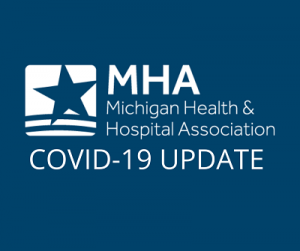
Michigan’s COVID-19 case numbers and hospitalizations have increased since early July with the onset of omicron variant BA.5. Here are the latest key statistics:
- 875 hospitalizations with confirmed or suspected COVID-19, a 20% increase since July 1.
- 23 pediatric hospitalizations with confirmed or suspected COVID-19.
- 67.6% of all residents have at least one dose of vaccine.
- 29.2% of kids aged 5-11 have now initiated vaccination.
- Roughly 2% of kids aged 6 months-5 years have initiated vaccination since approval was granted in mid-June.
The MHA continues to keep members apprised of pandemic-related developments affecting hospitals through email updates and the MHA Coronavirus webpage. Important updates are outlined below.
Governor Signs COVID-19 Liability Legislation
Gov. Gretchen Whitmer recently signed several COVID-19 liability-related bills:
- House Bill 5244 (Public Act 138 of 2022) amends Public Act 238 of 2020, which prohibits an employer from taking certain actions against an employee who does not report to work under circumstances related to COVID-19, to specify that the Act would not apply to a claim or cause of action that accrued after July 1, 2022. In addition, the bill will repeal PA 238 of 2020 effective July 1, 2023. HB 5244 was sponsored by Rep. Andrew Fink (R-Hillsdale).
- House Bill 6128 (Public Act 140 of 2022) amends Section 85 of the Michigan Occupational Safety and Health Act to specify that certain conditions establishing immunity for employers whose employees were exposed to COVID-19 would not apply to an exposure that occurred after July 1, 2022. In addition, the bill would repeal Section 85 and Section 85a, which defines COVID-19 under the Act, effective July 1, 2023. HB 6128 was sponsored by Rep. Yousef Rabhi (D-Ann Arbor).
- House Bill 6215 (Public Act 139 of 2022) amends the COVID-19 Response and Reopening Liability Assurance Act to specify that the Act, which provides immunity to a person that acts in compliance with certain federal, state and local orders related to COVID-19, would not apply to a claim or cause of action that accrued after July 1, 2022. In addition, the bill would repeal the Act effective July 1, 2023. House Bill 6215 was sponsored by Rep. Graham Filler (R-DeWitt).
Novavax Vaccine Gets FDA Authorization
The Food and Drug Administration (FDA) granted emergency use authorization to Novavax’s COVID-19 vaccine July 13. The vaccine is a two-dose series administered three weeks apart and uses a different, older vaccine technology than is used in the messenger RNA vaccines and Johnson & Johnson shot.
Novavax’s vaccine is authorized for people ages 18 and older as a primary series. It may be appealing to those adults who were hesitant to receive another brand of vaccine due to the components or development process.
In a trial of more than 26,000 adults, two doses of the Novavax COVID-19 vaccine were more than 90 percent effective at preventing symptomatic disease. For adults 65 and older, effectiveness was more than 78 percent. There were no serious side effects or safety concerns.
The Centers for Disease Control and Prevention (CDC) will next decide whether it will endorse the vaccine. The CDC Advisory Committee on Immunization Practices will meet July 19, though an agenda is not yet available.
The Biden administration recently announced that it had purchased 3.2 million doses of the Novavax vaccine. If the vaccine is recommended by the CDC, it will be made available at no cost to states, jurisdictions, federal pharmacy partners and federally qualified health centers. The MHA will keep members apprised of vaccine availability and ordering processes at the appropriate time. Members with questions may contact Ruthanne Sudderth at the MHA.
Additional information on the COVID-19 pandemic is available to members on the MHA Community Site and the MHA COVID-19 webpage. Questions on COVID-19 and infectious disease response strategies may be directed to the MDHHS Community Health Emergency Coordination Center (CHECC).
